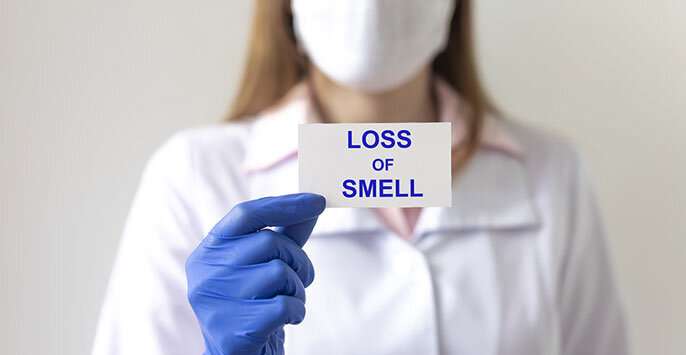Connection between COVID-19 and loss of smell uncovered by research team


About 70% of people with COVID-19 suddenly lose their sense of smell, although fewer of them seem to realize it, according to a new “living analysis” by a research team.
Vicente Ramirez, a Ph.D. student in UC Merced’s Public Health program, and researchers at the Monell Chemical Senses Center in Philadelphia have uncovered patterns that could help future coronavirus researchers.
“This is important work because it has the potential to reveal the virus’s activity in the body, and because loss of smell potentially has major impacts on quality of life in survivors,” said professor Stephen Wooding, Ramirez’s faculty advisor and an evolutionary geneticist and chemosensory scientist in the Department of Anthropology and Heritage Studies in the School of Social Sciences, Humanities and Arts.
Ramirez had a summer research position at Monell last year, returned to continue his collaborations this year and got looped into the novel coronavirus work.
“The students were supposed to be doing wet-lab work,” Monell Associate Director Danielle Reed explained, “but that stopped because of COVID-19. I had been hearing all these strange reports about people losing their senses of smell and taste and at first, I was skeptical.”
People with colds and flus report losing their senses of smell and taste, too, but COVID-19 is not the cold or flu, and sufferers don’t usually have congested noses.
Once the researchers started gathering data, they realized something was particular about COVID-19.
Ramirez, Monell postdoctoral researcher Mackenzie Hannum and other members of the Reed lab began collecting and carefully reading academic papers produced about COVID-19. They set specific criteria for which papers would be included in a meta-analysis. The goals were to produce an estimate of the prevalence of smell loss because of COVID-19 and to examine differences in the reported prevalence based on the method used to collect the data: an objective smell-and-report assessment or a subjective self-report—through an online survey—of symptoms by patients.

They found that the objective tests showed 70% of subjects lost their sense of smell; however, self-report tests showed that only about 50% of subjects claimed to have an olfactory deficit.
“People don’t tend to have the same awareness of their sense of smell as of other senses,” Hannum said. “We don’t always have the language to describe it. People often mistake sense of smell for sense of taste.”
Though the research shows the loss of smell is common, what it does not uncover yet is how long that loss lasts.
That’s why Ramirez calls this study a living analysis—new information about COVID-19 and smell loss is continually being added.
To continue reporting findings, the team created a website that is updated daily with new data for other scientists to explore, including a global map showing the sources of new surveys added.
“We submitted our manuscript with 34 studies, but as of today, our website presents a meta-analysis on 119 studies and will continue to add more reports on this topic,” Ramirez said. “We hope that this growing analysis will continue to inform the importance of this symptom during the pandemic.”
The smell dysfunction is unique to COVID-19 when compared to other respiratory viruses, he said.
Source: Read Full Article